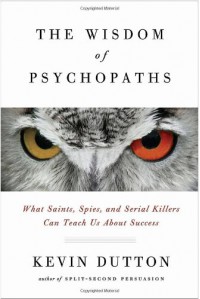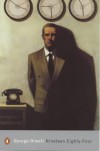The Wisdom of Psychopaths
 In the preface, Dutton remembers with pride and admiration his father, the amazing salesman who once sold a whole load of datebooks that only had eleven months instead of twelve: "Unique opportunity to get your hands on an eleven-month diary, folks ... sign up for a special two-for-one offer and get an extra month thrown in next year for free"..
In the preface, Dutton remembers with pride and admiration his father, the amazing salesman who once sold a whole load of datebooks that only had eleven months instead of twelve: "Unique opportunity to get your hands on an eleven-month diary, folks ... sign up for a special two-for-one offer and get an extra month thrown in next year for free"..But this is nothing compared to what Kevin Dutton is doing: selling an useless book, by suggesting that it can make readers more successful. "What saints, spies and serial killers can TEACH US about SUCCESS". "You could probably benefit from being a little more psychopathic yourself"... Yeah, right.
As if someone could deliberately chose to become a bit more psychopathic in order to become more successful.
At this point, the writer has already lost all credibility.
I started asking myself: is this guy writing out of passion, or maybe because he genuinely believes he is writing something useful, or just because he wants to make money and become famous?
After reading the preface, the purpose of the writer seemed already obvious to me.
"Psychopaths are fearless, confident, charismatic, ruthless, and focused." then "there are times when it’s actually a good thing when, by being a psychopath, you in fact have an advantage over other people".
Indeed, "a number of psychopathic traits were more prevalent among business leaders than among diagnosed criminal psychopaths".
This is the main idea, and it is repeated over and over in the book, in case readers did not get it by reading the book cover.
"The wisdom of psychopaths" is actually mildly entertaining, but also very repetitive, verbose, pretentious, and biased as it is promoting the writers point of view and his work ("I know, because I’ve tested them"). Sometimes it looks like the writer is just showing off ("I have cradled John Wayne Gacy’s brain in my hands") - the guy seems quite full of himself.
What this book really teaches us is that anyone can sell anything by using some shameless marketing techniques. How?
1) find a title that sounds brilliant, witty, eye-catching, odd, contrary to popular belief and distant from what we know from common sense (something like: "the wisdom of psychopats" or maybe "the joy of suicide" or why not, "the pleasure of depression"). People will think "oh really? I never thought of it, how can it be? I'm curious to know more". The subject will be perfect for small talk during coffee break in offices: "did you know that psychopats have a unique set of skills?" "let's find our if our boss is a psychopath". Someone might even buy the book (I'm so glad I didn't).
2) suggest the idea that readers will be able to become more successful after reading the book.
It's not true, but it does not matter, since most readers will find out after buying the book, not before.
3) include some interviews to top managers, top lawyers, top movie stars, top secret agents, top serial killers, basically anyone who is TOP, VIP, glamourous and trendy. If you don't have much time, just make up the interviews, pretending they wanted to stay anonymous: it's a lot faster and nobody will ever know.
4) search the scientific literature, you can always find a few studies that seem to support your bizarre theory. Like the study about collecting sweat from the armpits of first-time skydivers and waving it under the noses of a second bunch of volunteers, to see if they can smell fear in the sweat. A bit bizarre indeed. But it must be true and reliable because the writer says so.
5) work with top marketing experts to advertise the book on the media
Then you should become a top writer and maybe someday someone will interview you as an example to prove his bizarre theories about successful writers.





